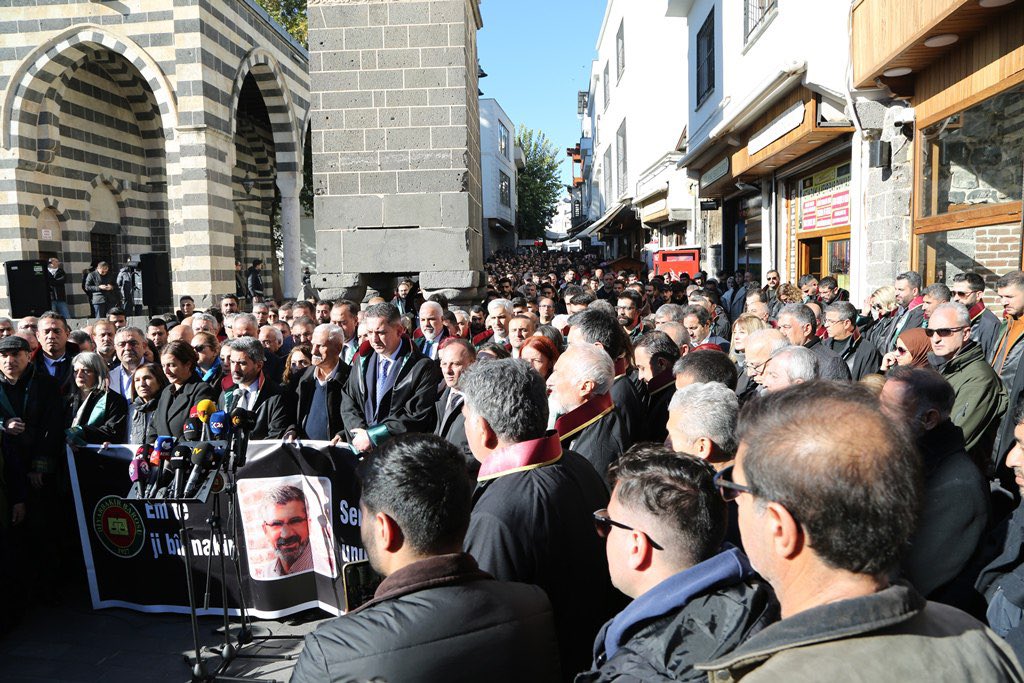Lawyers representing the family of slain Kurdish human rights lawyer Tahir Elçi are taking his case to Turkey’s Constitutional Court after a regional appeals court upheld the acquittal of three police officers who had been indicted in connection to the murder, the Voice of America (VOA) Turkish edition reported.
Elçi was killed in November 2015 while giving a speech in Turkey’s predominantly Kurdish province of Diyarbakır during a clash between the Turkish police and members of the outlawed Kurdistan Workers’ Party (PKK).
Turkish prosecutors claimed three police officers and a PKK member at the scene were suspects in the murder.
The three police officers — Mesut S., Fuat T. and Sinan T. — had been charged in an indictment with involuntary manslaughter, which carries a prison sentence of two to six years.
The Diyarbakır 10th High Criminal Court in June ruled for the acquittal of the three police officers, which became final after the Diyarbakır Regional Court, an appeals court, upheld its ruling last week.
The lawyers cannot file an appeal at the Supreme Court of Appeals because in cases when defendants face short sentences, regional appeals courts’ decisions cannot be challenged.
Given this, the Elçi family lawyers will file an individual application with the Constitutional Court, claiming Elçi’s right to life was violated and that justice has not been served.
Mahsun Batı, a lawyer for the Elçi family and chairman of the Tahir Elçi Foundation, told VOA that the appeals court decision came as a surprise to them, since they were expecting the court to reverse the lower court’s decision on the police officers.
“This is an unlawful decision,” Batı said, adding that there were many irregularities in the indictment and that the police officers should have been tried on charges of murder, not involuntary manslaughter.
He said that the appeals court did not consider the issues that the lawyers asked to be further examined, which were essential to understanding the murder and the role of the police officers involved. Instead, the court issued a brief ruling that failed to address their concerns.
Elçi’s lawyers argue that during the investigation, evidence in the case was inadequately collected. Despite requesting the questioning of certain police officers and officials, pointing out the lack of a crime scene investigation, their requests were rejected.
Forensic Architecture, a London-based multidisciplinary research group, investigated the controversial case at the request of the Diyarbakir Bar Association and released a report in 2019.
After a process of elimination, the report concluded that the prominent Kurdish human rights defender was most likely killed by one of three police officers present at the scene.
The group said in 2021 that the indictment, which holds a PKK militant responsible for the murder, was not realistic. The researchers said Turkish prosecutors holding an armed group member responsible for Elçi’s murder was problematic, saying that their findings clearly showed he could not have killed Elçi.
Meanwhile, 80 bar association across the country released a statement on Sunday criticizing the court decision upholding the acquittal of the police officers. They accused the authorities of not properly collecting evidence at the crime scene and protecting the police officers from being sentenced.
“Justice should be delivered without delay, the perpetrators of the murder should be punished,” the bar associations said in their statement.
Elçi called for a peace rally on what turned out to be the day of his death in Sur’s historic district. He said he wanted no violence, war, destruction or armed operations in the area.
Turkey had blockaded Sur at the time as part of mass operations against the PKK, with Diyarbakır’s historic “four-legged minaret” damaged during the clashes. Elçi was shot to death in front of the minaret, where he was delivering his call for peace.


